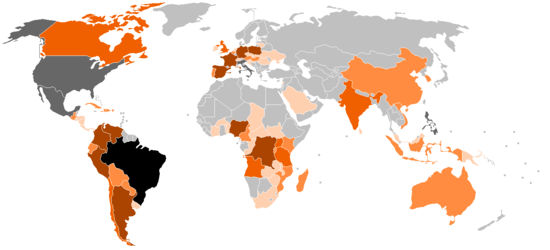Catholic Church in Kosovo
The Catholic Church has a population in Kosovo[a] of approximately 65,000 in a region of roughly 2 million people. Another 60,000 Kosovar Catholics are outside the region, mainly for work.[1]
The Roman Catholic Apostolic Administration of Prizren is the ecclesiastical territory or Apostolic Administration of the Roman Catholic Church in Kosovo. It is centered in the city of Prizren. Bishop Dodë Gjergji serves as administrator of the Apostolic Administration currently. Archbishop Juliusz Janusz, 66, originally a priest of the Roman Catholic Archdiocese of Krakow, Poland, is the Apostolic Nuncio to Slovenia and the Apostolic Delegate to Kosovo; he had served previously as Apostolic Nuncio to Hungary and before that as Apostolic Nuncio to Mozambique and Rwanda.
Currently the Holy See does not recognise Kosovo as a sovereign state (see also Holy See's reaction to the 2008 Kosovo declaration of independence).
Churches
-
Cathedral of blessed mother Teresa
-
Church of Letnica
-
Interior
-
Church of Stublla
-
Interior
-

Church ceiling of Morava e Binçës.
See also
| Part of a series on |
| Kosovo Albanians |
|---|
| Kosovo culture |
|
Art · Cinema · Dress · Literature · Music Sport · Cuisine · Mythology |
| By region or country |
|
Kosovo · Australia · Bulgaria Croatia · Germany Greece · Italy Kosovo · Macedonia Montenegro · Romania Serbia · Sweden Switzerland · Ukraine · United States |
| Varieties of Albanian |
|
Gheg · Tosk · Arvanitika Arbëresh · Cham |
| Religion |
|
Islam in Kosovo Christianity in Kosovo Roman Catholicism Kosovo Protestant Evangelical Church |
| History |
| Origins · History |
- Religion in Kosovo
- Human rights in Kosovo
- Freedom of religion in Kosovo
- Christianity in Kosovo
- Laramans, historical community of crypto-Catholics
Notes
| a. | ^ Kosovo is the subject of a territorial dispute between the Republic of Kosovo and the Republic of Serbia. The Republic of Kosovo unilaterally declared independence on 17 February 2008, but Serbia continues to claim it as part of its own sovereign territory. The two governments began to normalise relations in 2013, as part of the Brussels Agreement. Kosovo has received recognition as an independent state from 110 out of 193 United Nations member states. |
References
- ↑ "In Kosovo, whole families return to Catholic faith" catholicnews.com 9 February 2009 Link accessed 21 March 2010
